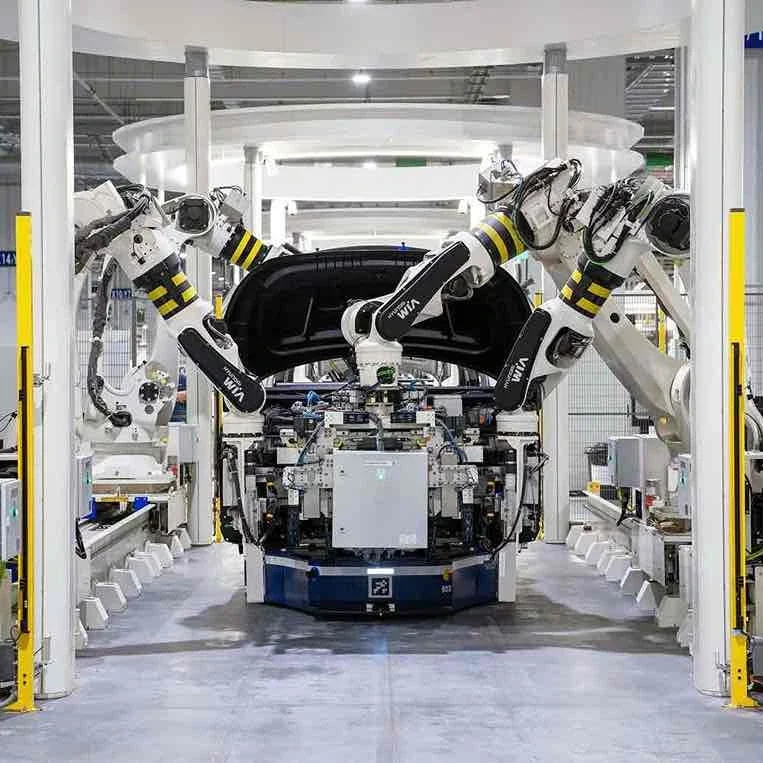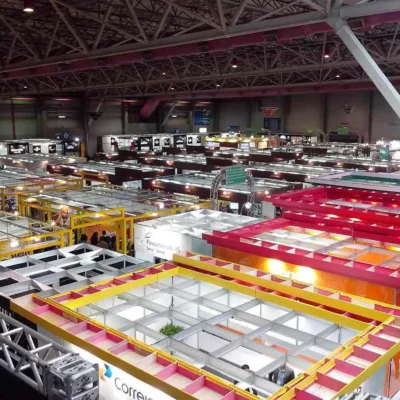When you automate your processes, you want a solution that works quickly and integrates easily. Turnkey solutions deliver that. These systems come pre-built, tested, and ready to use, allowing you to skip the long setup process typical of custom-built systems. Turnkey solutions simplify automation and help you avoid common headaches, making them a popular choice.
If you’re looking for a reliable way to improve efficiency, reduce downtime, and stay competitive, this could be the right choice for you. You’ll see results faster, and the risk of complications is much lower.
Understanding Turnkey Robot Solutions:
What Makes a Robot Solution ‘Turnkey’?
A turnkey robot solution works the moment it arrives. It combines pre-engineered hardware and software, removing the need for custom setups or extensive programming. You can easily integrate it into your current system with minimal effort. Turnkey solutions handle complex automation tasks, helping you start faster and avoid technical headaches.
Types of Turnkey Solutions in Robotics:
There are several types of turnkey robot solutions available depending on your needs:
- Robotic Arms with Pre-Installed Software: These come with built-in programs that make them easy to deploy in various applications like machine tending or welding. The software is often designed to handle specific tasks with minimal adjustments required.
- Autonomous Mobile Robots for Logistics: Ideal for transporting materials in warehouses and factories. These robots use advanced navigation systems and are ready to operate immediately upon delivery. No additional hardware installations are required.
- Integrated Systems for Specific Applications: For tasks like palletizing, pick-and-place, and packaging, turnkey systems come pre-configured to handle specific automation needs. This helps you avoid the need to develop custom setups and ensures faster implementation.
Key Benefits of Turnkey Robot Solutions:
1. Ease of Integration:
Turnkey solutions come fully configured and ready to integrate into your existing setup. You don’t have to worry about complex installations or major adjustments. This reduces downtime and simplifies the process, helping you get started faster without interrupting your operations.
2. Cost Efficiency:
Although turnkey solutions might seem expensive upfront, they save you money in the long run. By reducing the time and effort needed for custom engineering, they cut down on development costs. You also avoid the hidden costs of fixing errors that could arise with custom solutions.
3. Reduced Risk:
Turnkey solutions are tested and refined before delivery, which means they are reliable from day one. This reduces the risk of technical issues after installation, giving you peace of mind that your automation process will run smoothly without unexpected problems.
4. Faster Deployment:
Since turnkey solutions are pre-configured, the time to deploy is much shorter compared to custom setups. You can automate your processes quickly, allowing you to see results faster and stay competitive in your industry..
5. Vendor Support:
Most turnkey solutions come with support from the vendor. This often includes warranties, technical support, and maintenance options. With reliable support in place, you can troubleshoot any issues more easily and ensure that your system stays up and running.
Applications of Turnkey Robot Solutions:
For SMEs:
Turnkey robot solutions are a perfect fit for small and medium-sized manufacturers that may not have in-house engineering capabilities. If you’re running a smaller operation, you likely want a solution that’s simple to install and doesn’t require heavy technical expertise. Turnkey systems come pre-configured and ready to go, allowing you to integrate them into your production line with minimal hassle..
For example, collaborative mobile robots (CMRs) are ideal for logistics applications in SMEs. These robots can transport goods across the warehouse without needing physical guides, saving you time and labor costs. Similarly, automated palletizing solutions help streamline packaging by stacking products quickly and consistently, reducing manual labor and the potential for errors.
Industry-Specific Applications:
Turnkey robot solutions are also valuable in specific industries where automation is essential. In automotive manufacturing, turnkey solutions can include robotic welding systems that are ready to start work upon installation. These systems are optimized to ensure precision and repeatability in tasks such as spot welding or assembly).
In packaging, turnkey robots can handle everything from labeling to palletizing, speeding up production and ensuring consistent product handling. For electronics assembly, turnkey solutions are often used for high-precision tasks like PCB soldering or component placement, where accuracy is crucial.
Need Free Advice For Your Robot Project?
Applications of Turnkey Robot Solutions
| Application: | Turnkey Robot Example: | Benefit: |
|---|---|---|
| Welding | Robotic welding systems | Precision, faster weld cycles, reduced labor costs |
| Palletizing | Automated palletizing systems | Consistent stacking, reduced manual labor |
| Pick-and-Place | High-precision robotic arms | Accurate part placement, increased production speed |
| Material Handling | Collaborative Mobile Robots (CMRs) | Efficient transportation of goods, flexible navigation |
| PCB Soldering | Turnkey soldering robots | High accuracy, repeatability, reduced errors |
| Machine Tending | Robotic arms with pre-installed software | Reduced downtime, increased safety |
| Packaging and Palletizing | Automated packaging robots | Fast, hygienic handling, minimized errors |
| Painting and Coating | Robotic painting systems | Consistent finish, reduced wastage, increased precision |
| Inspection and Quality Control | Vision-based robotic systems | Accurate, reliable quality checks, improved consistency |
| Sorting and Grading | Robotic sorting systems | Increased speed, precise sorting, reduced waste |
Turnkey vs. Customized Robot Solutions:
Customization Flexibility:
Turnkey solutions are designed to get you up and running fast. They come pre-configured with everything you need for common tasks like palletizing, welding, or material handling. While they save you time and effort, they do offer less flexibility. If your needs are straightforward, turnkey systems will do the job well. However, if your process is more complex or highly specific, a turnkey solution might not be flexible enough for you.
With a customized solution, you can build the system around your exact needs. This gives you more control and ensures the robot fits perfectly into your workflow. But customization requires more time, more technical resources, and a higher initial investment. You’ll need to weigh the flexibility against the extra time and cost.
When to Choose a Custom Solution:
You should consider a custom solution if your automation needs are unique. For example, in industries like aerospace or pharmaceuticals, where precision and compliance are crucial, a custom solution ensures you meet all requirements. If your process requires specialized tools or unusual configurations, a custom system will be a better fit.
On the other hand, if you’re looking for a quick, cost-effective solution for tasks like machine tending or pick-and-place, a turnkey solution is the way to go. It will provide everything you need with less risk and faster deployment.
Turnkey Solution Providers and Popular Robot Brands:
Popular Turnkey Solution Providers:
When you’re ready to automate, several companies offer reliable turnkey robot solutions, and Qviro can help you make the right choice. Universal Robots offers collaborative robots that come pre-configured for tasks like packaging and machine tending.
With Qviro, you can skip the long purchasing process. We listen to your needs and provide three alternative quotes within one week. You’ll also get personalized, 1-on-1 advice to help you make the right decision—all for free.
Brands Supporting Turnkey Solutions:
Certain brands make it easier for you to implement turnkey solutions. Fanuc robots are versatile and work in tasks like welding and assembly. Techman cobots come with built-in vision systems, making them perfect for more complex operations. Universal Robots also has a large range of accessories and tools, making it simple to integrate everything you need for your project.
With Qviro’s help, you can quickly compare options and get expert advice. This saves you time and ensures you choose the best turnkey robot solution for your needs.
How Much Do Turnkey Solutions Cost?
General Cost Overview:
The cost of a turnkey robot solution depends on the type of automation you need. For basic tasks like pick-and-place or machine tending, you should expect to spend between €50,000 and €100,000. This cost usually covers the robot, installation, and necessary software. These types of solutions are perfect if you’re looking to automate simple, repetitive tasks without a lot of custom setup.
Advanced Systems and Industry-Specific Applications:
If your application is more advanced, like welding, palletizing, or packaging, costs can range from €100,000 to €250,000 or more. For these projects, you’ll need specialized equipment, sensors, and software, which naturally increase the price. If you’re automating logistics with autonomous mobile robots (AMRs) or managing a fleet of robots, the cost can climb even higher, depending on the number of robots and the software capabilities.
Factors That Affect the Cost:
Several factors will influence the final price, including the size of your operation, the complexity of your tasks, and how much customization is required. Turnkey solutions come ready to use, which means you’re paying for convenience, quicker deployment, and less downtime. While the initial investment may be higher, you’ll save in the long run through efficiency and reduced errors..
For a clearer idea of how much your project will cost, Qviro offers a free service where we provide three alternative quotes in just one week, based on your specific needs.
How to Choose the Right Turnkey Solution for Your Needs:
Understand Your Automation Goals:
Start by identifying the tasks you want to automate. Do you need a solution for palletizing, packaging, or welding? Or maybe you’re looking for material handling with autonomous mobile robots (AMRs). Being specific about your goals will help you focus on the solutions that best fit your operation. Knowing exactly what you need will make it easier to find the right turnkey system.
Consider Your Budget & Timeline:
Turnkey solutions can vary widely in price depending on complexity. If you’re working with a tighter budget, you may want to begin with a basic robotic system for tasks like pick-and-place. For more complex needs like fleet management or high-precision assembly, you’ll need a bigger budget. Consider how quickly you need the solution in place, as turnkey systems generally allow for faster deployment.
Ensure Compatibility with Your Setup:
Make sure the turnkey system you choose will integrate smoothly into your existing setup. Check if additional hardware or software is needed. Brands like Universal Robots and Fanuc are known for their wide range of compatible accessories, which can make integration easier and reduce any unexpected issues during setup.
Conclusion:
In conclusion, turnkey robot solutions offer a practical way for you to automate quickly and efficiently. Whether you need a basic system for pick-and-place or something more complex like welding or logistics, turnkey solutions simplify the process. The upfront cost may be higher, but the savings in time, reduced errors, and less downtime make it a worthwhile investment. By understanding your goals and budget, you can choose the best option for your operation.







We are in need of a quote on turnkey automation systems. Can You assist?
Please advise on our interest in purchasing ,availability, Payment terms and time frame for delivery?
I await your response so we can forward specifications and requirements needed to enable to work through a detailed estimate
I look forward to your response